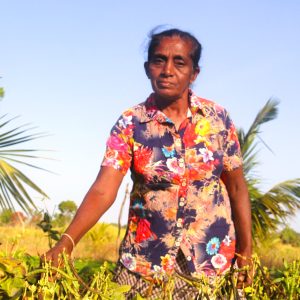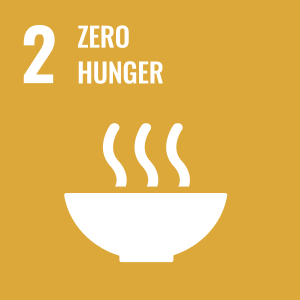These remarkable words attributed to Mary in the Gospel of Luke carry so much promise. From the text known as the Magnificat, they express both the exhilaration of a mother about to give birth and the anticipation of a new world that will come into being.
In the Magnificat, we can find the promise of salvation for everyone. One of the modern dangers is to focus on personal salvation rather than recognising that it is bound up with the salvation of the world. The vision encapsulated in the Magnificat is one of abundance – food plus good things for everyone who is hungry.
By supporting this year’s Christmas Appeal and in prayer, you can help make the promise of food real for many families who often have none. In these rocky times, the world needs more people like you who care about others and their right to food and dignity. Working together, we share God’s love in and with our world.
Facing the Climate Crisis with Love
The climate crisis is having a profound impact on many of the world’s poorest communities. Communities in Fiji have already moved further inland, Vanuatu is being hit by more cyclones, small-scale farmers everywhere are losing their crops because of flooding and drought – or because they no longer have access to water. Hunger was decreasing but according to the FAO (Food and Agriculture Organisation) an estimated 122 million more people did not have enough to eat than in 2022.
Your gifts to the Christmas Appeal support the work of our local partners teaching skills and sharing resources with some of the people who have been forgotten and left behind. They train and organise people to prepare for disasters and some like the Pacific Conference of Churches have taken the voice of the Pacific to the global climate talks happening in Dubai.
The Climate Crisis
There is no avoiding the rising climate crisis. The latest Intergovernmental Panel on Climate Change (IPCC) synthesis report points to the dangerous future the planet faces. It estimates 3.3-3.6 billion people live in “contexts that are highly vulnerable to climate change”. Between 2010 and 2020, human mortality from floods, droughts and storms was 15 times more in regions of high vulnerability than in those with low vulnerability.
In Aotearoa New Zealand, Cyclone Gabrielle gave many people a firsthand glimpse of the harm that more intense disasters could bring. Overseas, our partners reported more drought, flood,s and changing weather patterns. If the climate was ever predictable, we can be confident that the way things were is not how it is going to be in the future.
The future may be uncertain, but it does not mean there are no signposts or directions for the way ahead. The Magnificat is one signpost that points to the birth of Jesus and a new vision, where love of God and care for creation and each other are paramount. As we mark the season of Advent and Christmas, let us keep to this track.
 Like any gardener, Somawathie (pictured) plants seeds in the hope of a good crop. While she is happy to share some of her harvest with wandering elephants, she needs most of it for herself. Your gifts have already contributed to the training programme that helped her learn new, low-cost ways to grow food in very difficult times.
Like any gardener, Somawathie (pictured) plants seeds in the hope of a good crop. While she is happy to share some of her harvest with wandering elephants, she needs most of it for herself. Your gifts have already contributed to the training programme that helped her learn new, low-cost ways to grow food in very difficult times.
As part of the Movement for Land and Agricultural Reform (MONLAR), she has the support of other small farmers in her community and a network of specialists. Together they are tackling some of the big issues they all face like the hungry elephants and economic policies that rely on exploiting the land and the people. Your donation to the Christmas Appeal will support MONLAR and all of our partners in the work they do to make sure people have food now and in the future.
It’s easy to forget about the critical role played by small-scale farmers in feeding the world. 1.5 billion people live on less than 10 hectares of land, according to the Food and Agriculture Organisation (FAO). Many are extremely poor, but they provide up to 80% of the food in Asia and sub-Saharan Africa. Small-scale farmers can be very productive – the FAO undertook a study and found those who used sustainable agricultural methods could increase average crop yields by up to 79%. These farmers grow many more crops, use less fossil fuels, and avoid costly inputs.
Many of our partners work with small scale producers and farm workers. Like MONLAR, they run training programmes on regenerative or eco-agriculture and may distribute seeds, plants, and irrigation materials. Our partners bring people together so they can learn from each other and develop a community response to issues of common concern – like improving water sources, developing new markets and preparing for natural disasters.
In this year’s Christmas Appeal, Somawathie has generously shared her story with us. She gives us a glimpse of the daily challenges she faces and the ways MONLAR has supported her to grow food with dignity and courage. Many other farmers like her need that support now and in the future as the climate crisis bites more deeply. Working together, we can help people with the water, food and justice that is their need and the promise of God.
The 2023 Christmas Appeal
This year’s Christmas Appeal highlights the life-giving work of six of our partners – we have given an extra option for Christmas Day and ask that you pray for people from Ukraine and Gaza.
Your donations will give them the resources they need now to make sure families have water and food, displaced people can have shelter and participate in their new communities, children can attend school, and people can access the psychosocial support they need for their own well-being.
This is our Christmas story. By working together in ways that give life, we share God’s love for the world.
Towards a Sustainable Future
The world has passed the halfway mark on the Agenda for Sustainable Development 2030 with its 17 goals and 169 targets. This Christmas we focus on two of these goals:
In numbers
- 1 in 3 people were moderately or severely food insecure in 2021 (2.3 billion).
- Covid-19 pushed an estimated 150 million more people into hunger for some of the time in 2021.
- In 2022, an estimated 22.3% of children under age 5 were affected by stunting (148 million).
- Around 30% of women of reproductive age are anaemic.
- From 2012-2021, 2,113 people per 100,000 were affected by disasters compared with 1,198 people between 2005-2015.
- Global temperature has increased to more than 1.5 degrees Celsius. Real time emissions continue to rise.
- Climate finance to developing countries totalled US$83.3 billion in 2020, up by 4% on 2019. The global commitment is for $US100 million
Note: these and other statistics are available by clicking the link connected to each Sustainable Development Goal. UN statistics are not standard across all of its organisations.
The 2030 Agenda for Social Development
At the global level, CWS recognises the 2030 Agenda for Sustainable Development as one opportunity to address some of the factors that drive poverty and injustice.
In September 2015 at the United Nations General Assembly world leaders signed up to seventeen ambitious goals that if achieved would transform the world as we know it. From the first goal to “End Poverty in all its forms everywhere” to the 17th requiring a strong commitment to partnership and cooperation, nations agreed to a vision ‘to leave no one behind’. Alongside the goals are 169 targets – for example free and equitable primary and secondary school education for all – and the expectation that nations will report on their achievements. Governments are collecting the relevant statistics and dates are set for reporting. The interconnected goals were adopted by and for all countries, including Aotearoa New Zealand. The United Nations’ 2030 Agenda for Sustainable Development commits the world to universal goals.
ACT Alliance, the World Council of Churches and others produced the Sustainability Book which looks at the Agenda from a Christian perspective. Each goal is considered in turn using the see-judge-act method. There is valuable theological material that will add depth to what is produced here, plus prayers and questions for reflection.
Our partners can reach communities where governments cannot go. They know that change happens when people work together, sharing knowledge and skills. Donations to the Christmas Appeal will support their work and make sure no one is left behind.




